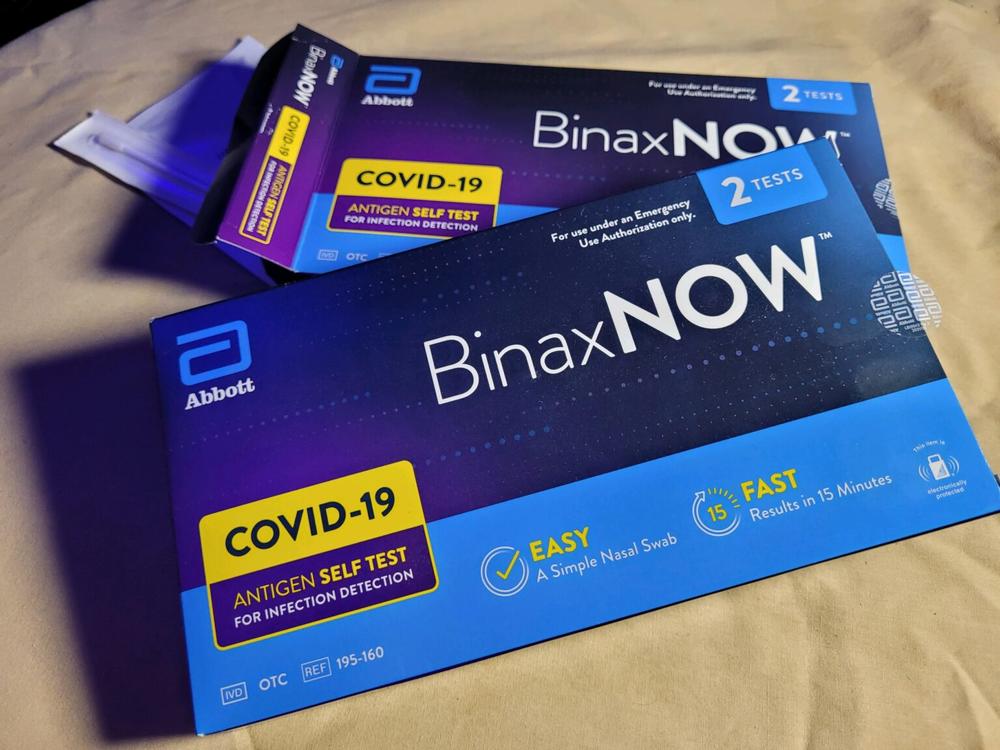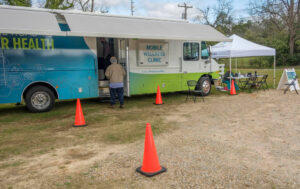
Caption
At-home COVID-19 tests could soon be covered by private insurance, but that may not mean much in poor or rural areas.
Credit: Ross Williams/Georgia Recorder

At-home COVID-19 tests could soon be covered by private insurance, but that may not mean much in poor or rural areas.
Testing yourself for COVID-19 at home could be easier and less expensive next month thanks to a new White House plan, but experts question whether the measure will be enough to help those living in poorer and more rural parts of Georgia.
Under the plan, announced by President Joe Biden this month, Americans who have private insurance will be able to buy at-home tests and be reimbursed by their insurance company starting by Jan. 15.
“For those not covered by private insurance, we’re going to make available free tests at thousands of convenient locations, locations for folks to pick them up and take a test kit home,” Biden said presenting the plan at the National Institutes of Health. “Bottom line, this winter, you’ll be able to test for free in the comfort of your home and have some peace of mind.”
The White House says the federal government will double the number of free tests available at community sites to 50 million and add rural clinics to the list of distribution sites.
Data show Georgians are not getting tested as much as other Americans — the Kaiser Family Foundation reports Georgia residents go through 832 tests per million people each day compared with a national rate of 2,424, putting Georgia at No. 46 in the nation.
Increasing the availability of tests is always a good thing, said Mary Ukuku, assistant professor of public health at Kennesaw State University.
“It allows people to quarantine to make sure that they are not interacting more with other people, and so that way we can really eliminate or slow the spread of the virus or re-infection for people who’ve already been infected,” she said. “Testing just provides the opportunity for not only health care professionals to know how prevalent it is in our state, but it also is very much more important for empowering the individual so that they know how to protect themselves and protect their family.”
At-home testing is especially empowering, she said. The ability to test outside of doctors’ business hours means people can make better decisions about coming into work if they have a scratchy throat, feel more at ease about visiting elderly family members or just test regularly if they are particularly at risk.
Ukuku called the plan a step in the right direction, but she said there is more the White House could do to make sure vulnerable Georgians are able to get tested.
Georgia State University public health professor Harry Heiman agrees.
“There are some major gaps in the existing plan; one is the scale of it,” he said. “In terms of deploying 50 million tests, that doesn’t come close to the need in terms of the number that we need to scale up to.”
Another big problem is the requirement to pay up front, Heiman said. Plenty of Georgians might want to buy at-home tests but not have enough wiggle room in their budget to wait to be reimbursed, or they may simply not want to deal with saving their receipts and dealing with their insurance company.
“Even if you’re low income and insured and you’re going to get reimbursed, it still requires paying $10 to $25 up front, and if you’re uninsured, you can’t get reimbursed by insurance,” he said. “In a state like Georgia, where, unfortunately, we still have a very high uninsured rate relative to the rest of the country, and it’s a significant barrier, especially to those populations who are low income and more likely to be in those frontline jobs and service professions and other and other areas where they’re going to be at higher risk for potential exposure.”

A mobile health clinic used by Phoebe Putney Health Systems to take COVID-19 vaccines on the road to rural communities and into neighborhoods.
Georgia has one of the highest rates of uninsured residents in the country. In 2019, 13.4% of Georgians were not covered by private or public insurance, compared with 9.2% of Americans, according to U.S. Census data.
Barriers can be even higher in rural parts of the state, where much of the health infrastructure has vanished and residents may need to travel long distances for medical care, Heiman said.
“I think a better plan would be creating a mechanism where tests can be deployed directly to people in their homes,” Heiman said. “Barriers to access to some of those clinics are still significant in low-income urban communities and rural communities.”
“It’s a sorry situation that two years into the pandemic, we still haven’t figured out how to make testing easily available and affordable to everyone in this country, that we haven’t figured out a way to ensure that every person in the country has access to masks when they need them, and there are still communities across the country where access to vaccines is still a challenge,” Heiman added.
Other public health experts have come to the same conclusion, pointing to European countries where tests are free or only cost the equivalent of a couple dollars and can be received through the mail.
White House Press Secretary Jen Psaki was panned by health experts as glib and flippant when she appeared to dismiss a question about why the U.S. cannot adopt similar policies.
According to Politico, White House officials opted to route the plan through private insurance companies after concluding sending tests out to all Americans for free would be too expensive and inefficient, with many tests likely to go unused.
Dr. Ashley Register, a primary care physician in Cairo, said COVID-19 cases have thankfully gone down recently in his neck of the woods near the Florida state line, but he’s still ordering plenty of COVID-19 tests as well as tests for other respiratory diseases for when ill patients come in.
“All the doctors provide it, multiple drug stores,” he said. “I don’t think right now there’s a shortage, certainly there have been times when there were. Granted, when you come in to see us, it has a cost with it, and the urgent care, the pharmacies, it’s not free, so it will be interesting.”
Register said he will be glad to see at-home tests become more available, but he is skeptical whether some in his community who mistrust medical advice will go out of their way to pick them up.
“In Grady County, 65% won’t even come get a free vaccine,” he said. “They won’t even do that when it’s free.”
This story comes to GPB through a reporting partnership with Georgia Recorder.